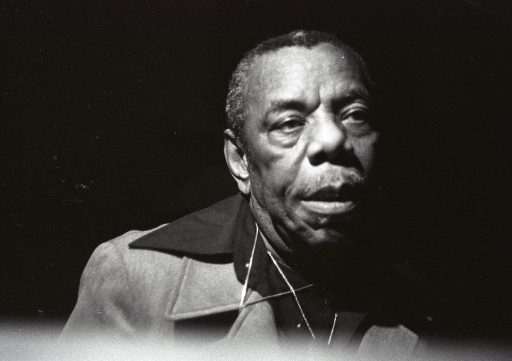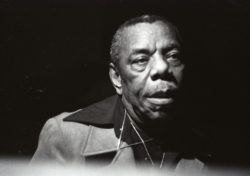Champion Jack Dupree
Champion Jack Dupree was was best known as a barrelhouse pianist and songwriter/raconteur but was also an accomplished boxer and cook.

Courtesy of Wikimedia Commons
Champion Jack Dupree. Malte
An accomplished boxer, cook, barrelhouse pianist, and songwriter/raconteur, William Thomas “Champion Jack” Dupree was a colorful yet unassuming individual whose life spanned the twentieth century. Early in his life, he lived in New Orleans, where he learned the fundamentals of boogie-woogie piano. He carried out a sustained piano apprenticeship with musicians he encountered during travels in the Midwest before serving a two-year stint in the Navy as a shipboard cook during World War II. He returned from the war and established a professional performing and recording career in New York City. In 1960 Dupree relocated to Europe and stayed for the next thirty years. There he was regarded with great affection and appreciation as a living treasury of twentieth-century urban blues and, specifically, of the rich history of New Orleans barrelhouse piano players.
Apprenticing through On-the-Job Learning; Branching out into Boxing
William Thomas Dupree, the youngest of six children, was born in New Orleans. His father was from Zimbabwe (then known as the Belgian Congo) and his mother was of Creole and Cherokee descent. Dupree’s parents ran a grocery store in the Irish Channel neighborhood, and the family lived upstairs. In 1917 the structure was destroyed by a fire that killed his parents, leaving the eight-year-old an orphan. He was assigned to the city-run Colored Waif’s Home for Boys, an orphanage where a young Louis Armstrong also had recently spent time. Learning piano fundamentals from an Italian priest there, the precocious and resourceful Dupree would often sneak away to hear some of the best New Orleans pianists who frequented the many low-down establishments in the port city. He became proficient in the barrelhouse tradition, one established by a previous generation of gifted players, most prominently Ferdinand “Jelly Roll” Morton, who had served his apprenticeship in the brothels of Storyville, New Orleans’s legalized prostitution district.
Older players would often let the young Dupree sit in when they needed a break; the boy, in turn, studied their individual styles assiduously, picking up what he could from each man. He later claimed he learned the most from Willie Hall, known professionally as “Drive ‘Em Down.” When he was fourteen, Dupree got a job in a dairy and left the orphans’ home, but he continued his pursuit of barrelhouse piano, now vying for attention with a small group of his peers. Often the younger players would play together. “By having a lot of good piano players,” Dupree later explained, “people would stay in the joint drinking and carrying on until noon the next day. We’d put a glass on the table and sometimes split $80 between us. During cane-cutting season, we’d go down and play on the plantations. We could live for a month on the money we made down there.” As his twenties approached, Dupree began traveling to cities in the Midwest, establishing connections in Detroit, Indianapolis, and Chicago. Nevertheless, work for piano players was scarce. A chance encounter in Detroit with heavyweight champion boxer Joe Louis convinced the slight-of-build Dupree that boxing—in the lightweight division—might make financial sense. He began training in New Orleans, took the professional name “Champion Jack” to honor Jack Johnson, the first black heavyweight champion, and eventually won a total of 107 bouts, including the Indiana state lightweight championship.
A Prolific Recording Career, European Residency, and a Final Homecoming
During the same period, Dupree’s musical education and professional advancement continued apace. In the 1930s he began spending more time in Indianapolis, where he befriended well-known blues pianist Leroy Carr, who often worked as a duo with the guitarist Scrapper Blackwell. Prior to Carr’s death in 1935 from cirrhosis of the liver, Dupree learned many playing techniques and blues numbers from the veteran. Following the elder musician’s death, Dupree got work headlining the Cotton Club in Indianapolis. Here, according to biographer Jeff Hannusch, “Part of [Dupree’s] show included risqué duets with Ophelia Hoy, which were a throwback to the days of vaudeville and medicine shows. This brief portion on Dupree’s career was also very influential, as humor would become an important element in Dupree’s [future] recordings and live performances.” Later, at the end of the 1930s, Dupree spent time in Chicago, where he befriended Big Bill Broonzy and Tampa Red, both of whom recorded for the Okeh label, regarded as the premier blues label of the day. Finally, in 1940, Champion Jack Dupree entered the recording studio for the first time and launched what would become a rewarding and prodigious career making records for numerous labels. World War II intervened, as Dupree was drafted by the US Navy and served his time as a cook, another skill he had mastered along the way. The now-veteran bluesman saw this, too, as part of the New Orleans barrelhouse tradition. “A lot of old piano players had to be good cooks,” he said. “When the pressure was on, a lot of women had to go to work while the men stayed home. Some mornings you could look in the yard and see the man hanging out baby diapers while the woman was leaving to go to work.”
Following his stint in the navy, Dupree settled in New York City and began his recording career in earnest, often making records for multiple labels under pseudonyms to avoid contractual conflict, a common practice at a time when artists frequently received an appearance fee for recording and seldom any royalties. By 1958 Dupree recorded a record with a top-notch, four-piece band from Harlem that would later be considered an all-time classic, Blues from the Gutter, for Atlantic Records producer Jerry Wexler. He left for Europe shortly thereafter, returning to the United States nearly three decades later. “I was recording in New York and working for some gangsters at the time,” he later explained. “They booked me some dates and they sent me to Europe. I cashed in the return ticket and didn’t go back. I lived in London for a long time.” He also lived in Zurich, Switzerland, for an extended period before finally settling in Hanover, Germany. He continued to record frequently, once with the British bluesmen John Mayall and Eric Clapton, and appeared frequently at clubs, concerts, and festivals. Prior to his death but following a diagnosis of cancer in 1989, Dupree made two return visits to the United States, appearing in clubs and at festivals and spending considerable time in his beloved hometown of New Orleans. He also record a trio of albums for the independent Rounder label, Back Home in New Orleans, Forever and Ever and One Last Time, which, according to label head and founder Marian Leighton Levy, constitute an autobiographical memoir. More than five hundred fans and admirers attended his 1992 funeral, held in Hanover and featuring an American-flag draped casket and New Orleans-style jazz band.
